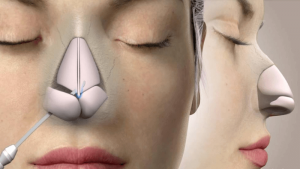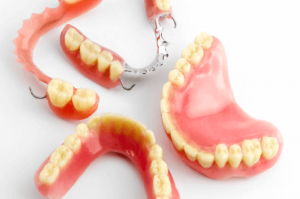
Most people have felt discomfort or pain when they bite a very cold food or drink a very hot soup in their lifetime. Even though this symptom can be the alarm for the problems of cavities in the teeth, it can also be a sign of having tooth sensitivity.
What is Tooth Sensitivity?
Tooth sensitivity is also called dentin hypersensitivity in dental literature and the name gives a hint of what it means. Because of certain foods of hot or cold temperature, you might feel pain or discomfort in your teeth. This is called tooth sensitivity. Even though it may be a temporary dental problem or a permanent one, tooth sensitivity can happen for one tooth or several, even for all the teeth of a patient. Causes can vary for sensitive teeth but the treatment can be as simple as changing the oral hygiene routine.
Symptoms
Certain foods can stimulate pain or discomfort if one has sensitive teeth. This pain can be felt at the roots of the affected teeth. Triggers can vary but there are most common ones we can talk about :
- Cold foods or drinks
- Hot foods or drinks
- Cold air
- Sweet foods
- Acidic foods or beverages
- Brushing or flossing teeth
- Alcohol-based mouth rinsing products
Causes and Treatments for Tooth Sensitivity
Some people have thinner enamel in their teeth therefore they have sensitive teeth problems naturally. Since enamel is the most exterior layer of the tooth, having thinner enamel makes them vulnerable to certain triggers. Even though some people naturally have thinner enamel, the enamel layer can also become thinner due to some activities. These activities are:
- Brushing the teeth too hard
- Using a hard toothbrush
- Grinding teeth at night
- Regular consummation of acidic foods and beverages
Following the erosion of the enamel layer, patients will not only experience sensitive teeth but also might have the need for dental veneers. If the enamel layer becomes too thin, dental veneers can be the solution for these patients. You can have a look at our blog post on dental veneer procedures in Turkey to have more ideas.
In addition to these activities, some conditions might also lead to tooth sensitivity. Gastroesophageal reflux (GERD) can make acid go up from the stomach and esophagus and this will lead the teeth to wear down eventually. Other conditions that cause excessive vomiting, like gastroparesis and bulimia, can also be the causes for thinner enamel, therefore leading to sensitive teeth.
Gum recession can also cause teeth to be exposed and unprotected, therefore leading to sensitivity. Tooth decay, broken teeth, chipped teeth can also be the causes for the sensitivity. In these cases, generally, the patient has a sensitivity with a single tooth or some particular area inside their mouth.
Temporary dental works like getting fillings, crowns, and teeth bleaching might also cause temporary sensitivity in your teeth. You may feel the sensitivity in particular teeth and surrounding areas. This type of sensitivity might cease after a couple of days.
Treatment for Sensitive Teeth
The treatment and the procedure to look for will be dependent on the severity of your condition. If the tooth sensitivity is mild, then you may consult your dental professional for this problem. But there are initial steps to overcome the sensitive teeth issue with your dental choices.
- Choosing the right toothpaste is the first step to overcome tooth sensitivity. You should choose the kinds of toothpaste that are labeled and addressed to sensitive teeth specifically. Toothpastes that are specifically made for sensitive teeth will not cause any irritation with their ingredients. Also, the ingredients may help you block the discomfort from the outer surface of the tooth to the nerve of the tooth.
- Mouthwash choice is also another important factor. You should choose the alcohol-free mouth rinsing products. Because this type of mouthwash products will not increase your tooth sensitivity like alcohol-based mouthwash products.
- Choice of toothbrush will also affect the sensitive teeth. You should choose the softer toothbrushes and you should brush your teeth more gently in order to have less sensitive teeth. The soft toothbrushes are clearly stated on their covers.
What Happens After?
If you follow these steps, you will be able to see the improvements in your sensitive teeth in a week. You should repeat these steps every day and make them your daily dental hygiene routine.
If the change in your dental hygiene routine at home does not work, then it is better to consult your dental professional. Your dentists might prescribe you a specific toothpaste and mouthwash. They might also apply fluoride gel. This will help your teeth to strengthen the enamel layer, therefore protecting your teeth in general against sensitive teeth.
If you are also experiencing clenching and grinding your teeth, you should be careful to stop during the daytime. Stress-reducing techniques and less caffeine might help you to stop clenching and grinding your teeth during night time. You can also consult your dentist and they can prescribe you a mouthguard to use at night for preventing the grinding therefore helping you prevent further damage to your teeth.
Conclusion
Even though it can be a temporary or permanent problem, patients might suffer from sensitive teeth situations. You can change your dental hygiene routine if you want to see an improvement in your situation. If this does not work, you should consult your dental professionals to seek further dental help. They might prescribe you specific toothpaste, mouthwash and they might even prescribe you a mouthguard to prevent grinding at night. These changes will help your enamel layer on the outer surface of the teeth to strengthen. Therefore your teeth will not be susceptible to be sensitive.
You can read our previous post on https://smileteamturkey.com/blog/how-long-do-dental-treatments-take-turkey/





